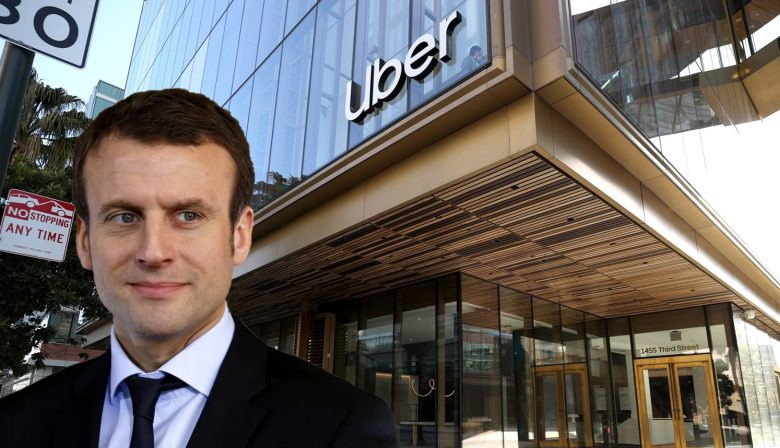
French President Emmanuel Macron is under fire for his newly-revealed past support for American company Uber to purportedly relax labor and taxi laws and also for signing a “secret deal” with the giant cab-hailing business.
Paris, July 12 (RHC)-- French President Emmanuel Macron is under fire for his newly-revealed past support for American company Uber to purportedly relax labor and taxi laws and also for signing a “secret deal” with the giant cab-hailing business.
An international media investigation based on leaked files, known as “Uber Files,” was published on Sunday and shocked the French public when it revealed that Macron went to “extraordinary lengths” to back Uber’s attempts to disrupt France’s closed-shop taxi industry when the then 37-year-old ex-Rothschild banker was economy minister from 2014-2016.
The Uber Files is a global investigation based on a trove of 124,000 documents, including 83,000 emails and 1,000 other files involving conversations, spanning 2013 to 2017, that were leaked to the British newspaper The Guardian from an anonymous source.
Forty other international newspapers, including French newspaper Le Monde and the International Consortium of Investigative Journalists (ICIJ), also participated in the exhaustive analysis of documents.
Apart from holding several clandestine and undeclared meetings with Uber executives between 2014 and 2016, Macron also inked a secret deal with Uber on regulation of the U.S. company's ride-hailing services at a time when it was disrupting the traditional taxi market, the investigation alleged, citing leaked internal documents and text messages.
In the wake of the bombshell leak of “Uber Files,” French opposition lawmakers on the left and far-right unleashed a barrage of attacks against Macron, who described himself as a pro-enterprise, pro-innovation politician when he first emerged as a national figure in 2014.
On Monday morning, senior far-right legislator Sebastien Chenu said Macron was “a lobbyist at the service of foreign private economic interests.” He also slammed the president for being "an ideologue for deregulation, for globalization.”
Alexis Corbiere, a hard-left lawmaker from the France Unbowed party, even suggested a parliamentary inquiry, which could prove embarrassing for Macron who lost his majority last month in the French parliament -- the National Assembly -- when Marine Le Pen’s far-right and the hard-left made major gains.
“It’s very serious the idea that with this secret pact Mr. Macron de-regulated the regulation of the taxi industry,” Corbiere told Public Senat television. “What lessons should be drawn? Obviously we’ll ask the questions to the government when we can, and a parliamentary enquiry as well,” he further said.
According to Le Monde’s analysis, Macron has been “more than a supporter, almost a partner” for Uber during the course of 17 meetings he or his staff had with the executives of the American company at a time when it faced multiple legal inquiries.
It is unusual for Macron to respond to public criticism and on Monday he only met with the heads of multinational investors in France at the annual “Choose France” summit at the Versailles chateau outside the French capital of Paris.
Meanwhile, the French president’s office announced a major investment worth 5.7 billion euros ($5.8 billion) for a new semiconductor factory in southeast France by French-Italian chipmaker STMicroelectronics and U.S.-based GlobalFoundries.
Macron was an avid public supporter of Uber when it arrived in France, unlike many of his colleagues in the Socialist government of the time.
Back in 2016 and during an interview with Mediapart, Macron defended his support for Uber, saying: “Go to Stains (a deprived area north of Paris) and tell young people there, who are willingly working for Uber, that it would be better to do nothing or deal drugs.”
The “Uber Files” also illustrate how the company’s former chief prevented the police from accessing files on its main server by shutting down systems. According to the analyses, Uber also sought to use violent attacks against its drivers during the 2016 anti-Uber protests to win public sympathy.
The U.S. company has stopped short of denying the allegations, saying it has moved from the policies of its former chief and changed how it does business.
The leaked files clearly demonstrate how Uber sought help from U.S. ambassadors known to both Plouffe and Messina to help smooth over relations in cities where Uber faced trouble. This made perfect sense since most senior U.S. diplomats abroad were big donors for former President Barack Obama.
Dating back to 2014, Uber had seen current and former US government officials as key to its expansion plans, according to a leaked memo contained in the files that were titled “Leveraging the US government to support Uber’s international business.”
An examination of the leaked internal Uber emails and communications also offers a rare insight into the company’s behind-the-scenes international lobbying efforts; the then Italian prime minister, Matteo Renzi, his Spanish counterpart, Mariano Rajoy, and the ruler of Dubai, Sheikh Mohammed bin Rashid al-Maktoum, were among those Uber sought to gain access to, sometimes with mixed success.

